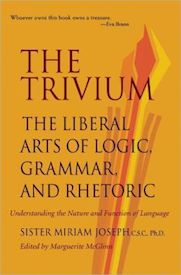The Trivium
“The Trivium” is a rigorous and utterly delightful presentation of the three areas that form the basis for all learning: logic, grammar, and rhetoric. Sister Miriam Joseph Rauh, a professor of English at St. Mary’s College for thirty years, helps you see the unity and harmony of these three areas as she gives you solid and easily-grasped explanations of even their most abstruse elements: not just general grammar, but also propositions, syllogisms, enthymemes, fallacies, poetics, figurative language, and metrical discourse! Attractively laid out to maximize clarity, this book is also packed with lively examples, exercises, and illustrations drawn from the works of Shakespeare, Milton, Plato, and others. The examples are so rich that they’re a literary education in themselves.
In the Middle Ages and the Renaissance, students studied and mastered language in the integrated way taught by this book. Modern education, by contrast, suffers from separating the parts from the vision of the whole. That’s why Sister Miriam Joseph designed and taught an introductory course on the classical trivium: to help students “acquire mastery over the tools of learning.” This book is the fruit of that course.
Among the many things you’ll learn in The Trivium:
- How to distinguish various types and moods (with examples drawn from Boswell’s Life of Johnson, Euripides’ Iphigenia, and the Bard’s Henry V)
- Help to tell the difference between an absolute and a qualified statement – from the Bible!
- Stirring examples of figurative language from the Psalms, Shakespeare, Tennyson, and other masters
- Heroic couplets, heroic quatrains, Italian sonnets, English sonnets: how to make your way easily through all the confusing nomenclature — and enjoy the poetry
- Seven important definitions that clarify the relationship between language and reality
- Aristotle’s ten categories of being: still relevant to help you make sense of the world today
- Definitives, connectives, prepositions, conjunctions: general rules
- Simple, down-to-earth direction to help you navigate the thorniest thickets of abstract logic — including Aristotelian and Goclenian sorites, epicheirema, mediated opposition, and more
- Syntactical analysis in general grammar: how it can help you think more clearly and express yourself more precisely
- Famous definitions from Arnold Bennett, Matthew Arnold, and St. Paul
- Three fallacies of the dilemma, and how to spot them
- You’ve probably heard of argumentum ad hominem, but what about argumentum ad populum? Ad misericordiam? Ad verecundiam? How to parse these popular politicians’ tricks
- Characters in great literature: examples of those that are not well developed, those that are recognizable types, and those that are fully drawn
- Why empirical knowledge so often requires revision
- Can you spot the six anacrustic lines in William Blake’s “The Tyger”? Clear definitions of all types of meter
- Onomatopoeia: illustrated from works by Pope, Tennyson, and John Updike
- Guidance on making explicit everything that’s implicit in a given proposition: a necessity given the state of political discourse today!
- “He was an Einstein at problem solving”: can you name the figure of speech that this exemplifies?
- Why the beginning of the story is often best when it’s not what you find on page one
- Point of view in literature: examples of various kinds, taken from Dostoyevsky, Kipling, Browning, and Faulkner
- The one and only condition under which a dilemma is open to rebuttal
- The structure of a story: analyzed with reference to Guy de Maupassant’s “The Piece of String”
- Ten rules of the syllogism and formal fallacies — and three rules of a valid syllogism
- Four classifications of propositions that have been in use since classical times
- Help from Thomas More to cut through the bluff and bluster and come to the truth of a proposition
- Evaluating arguments: exercises from Homer, Marcus Aurelius, Aeschylus, Boethius, Shakespeare, and Cardinal Newman
In today’s age of media manipulation, the precision and clarity of thought that this book gives you is essential to help you and your kids discern the truth behind all the bias and puffery of the daily news. Indispensable for homeschoolers, The Trivium: The Liberal Arts of Logic, Grammar, and Rhetoric is a terrific resource for students, teachers, and anyone — no matter what your job or state in life — who wants to become a better writer, speaker, and listener.
“A highly recommended and welcome contribution to any serious and dedicated writer’s reference collection.” – Midwest Book Review
“If you are serious about classical education, The Trivium deserves a place on your
bookshelf.” — Martha Robinson, Homeschool Christian
“Whoever owns this book owns a treasure.” — Eva Brann, St. John’s College
“Is the trivium, then, sufficient education for life? Properly taught, I believe that it should be.” — Dorothy Sayers
- The Author
Sister Miriam Joseph Rauh
Sister Miriam Joseph was born Agnes Lenore Rauh in 1898 to Mamie Anne Priesendorfer and Henry Francis Rauh, in Glandorf, […] More about Sister Miriam Joseph Rauh.














